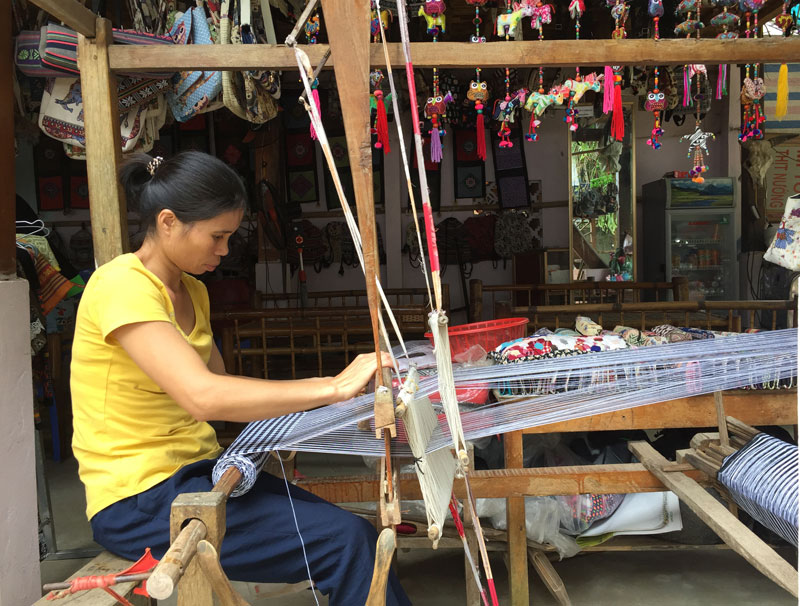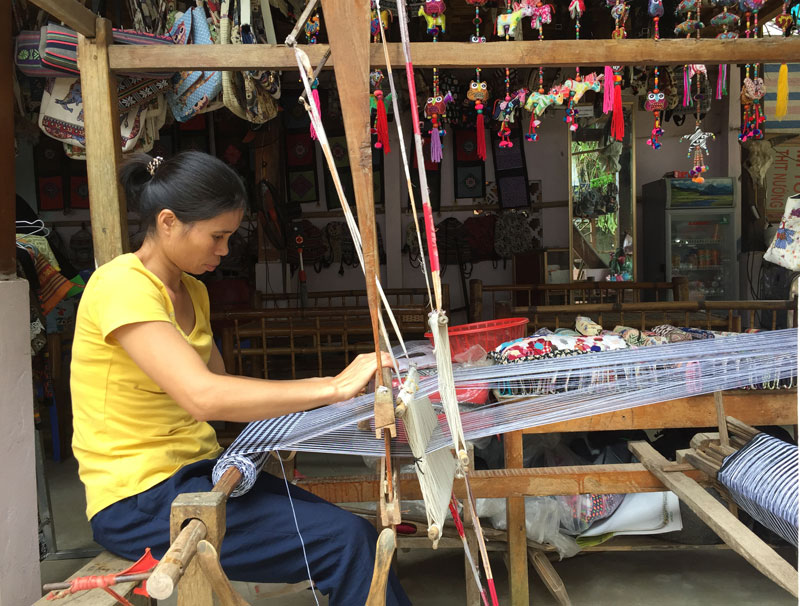
(HBO) – Drastic efforts to improve vocational training has helped raise local living standard in Chieng Chau hamlet, Chieng Chau commune, Mai Chau district, Hoa Binh.
Chieng Chau hamlet is home to 293
people of working age. Before 2015, nearly 10 percent of local families lived
under the poverty line.

A
woman in Chieng Chau hamlet, Chieng Chau commune, Mai Chau district sits on the
brocade weaving loom.
The locals here now have better
awareness of the importance of vocational training, after the hamlet’s Party
cell teamed up with members of the local youth and women’s unions to persuade
people to participate in vocational training courses at the community learning
centre.
After each course, the hamlet
reviewed individuals’ performances and awarded those with outstanding results.
As trainees of the courses have
effectively applied what they learnt during the courses in practice, more and
more people have enrolled.
Besides the courses held by Chieng
Chau commune, Chieng Chau hamlet itself has organized two training courses
providing legal knowledge for people aged above 15 years old.
Thanks to such effort, more than
200 labourers in the hamlet have received short-term training. The hamlet has
been able to establish a brocade weaving cooperative with 20 workers, a
10-worker group of brick production, a community-based tourism site employing
10 locals, five carpentry groups with 60 labourers and a number of cooperative
groups in construction, mechanical engineering, motorcycle repair and rice
husking.
The revival of traditional brocade
weaving not only creates jobs for the locals but also helps with the
preservation of local cultural identity.
This year, income per capita in
the hamlet reached 22 million VND per annum and the household poverty rate
reduced to below 7 percent. Now, all households have access to clean water and the
national electric grid and 90 percent of them own a motorcycle. Over 90 percent
of roads here have been concreted./.
.
The emulation movement "Hoa Binh joining hands to build new-style rural areas” has been widely spreading, becoming a driving force that motivates the localities to renew rural landscapes and improve the material and spiritual lives of the residents. In this movement, the people play a central role-both as the main implementers and direct beneficiaries of its outcomes.
In response to the global digital revolution, Hoa Binh Newspaper is transforming itself into a modern and multi-platform media hub, blending cutting-edge technology with a restructured newsroom and a new generation of tech-savvy journalists.
Hoa Binh province’s Association of the Elderly recently held a conference to review the project on expanding the inter-generation self-help club model until 2025.
In a move to implement Resolution No. 57-NQ/TW, issued on December 22, 2024 by the Politburo, which targets breakthroughs in science-technology development, innovation, and digital transformation, the Hoa Binh provincial Department of Health has issued a plan to roll out the "Digital Literacy for All” campaign within the local health sector.
An Nghia Commune (Lạc Sơn District) is one of the communes that achieved the tha standard of the national new rural area in 2018. Entering a new development phase, the commune is now trying to meet the criteria for the advanced new rural development. With the strong political will and the public consensus, the commune is gradually overcoming the challenges to reach this goal, aiming for the sustainable development.



